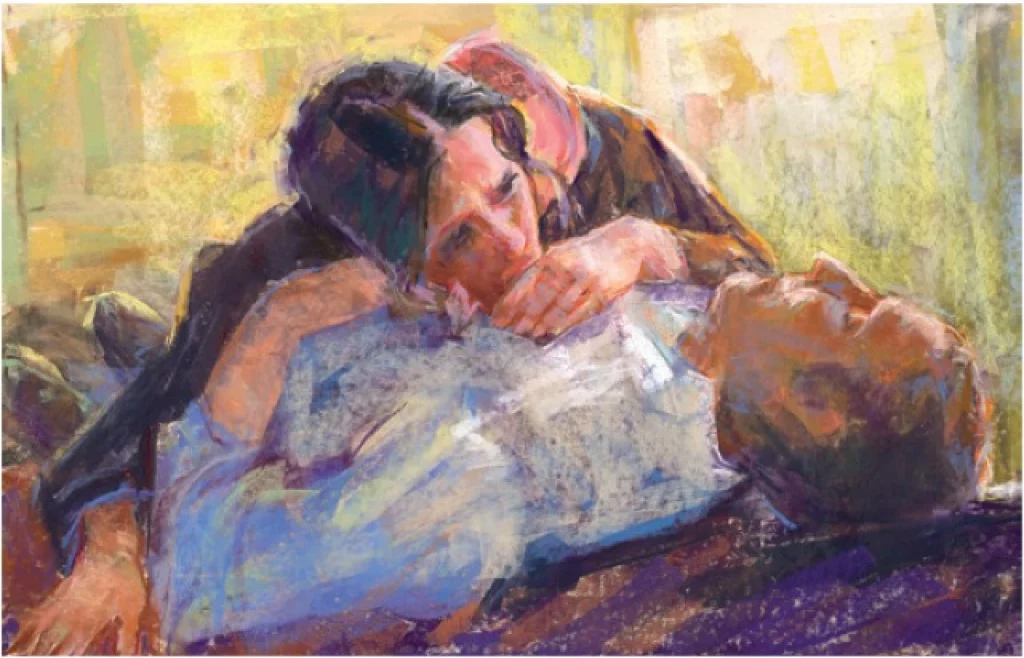
Carthage Jail is a very somber reminder of the persecutions the Saints faced in the early days of the Church. Joseph and Hyrum both were good, humble men, trying to follow the precepts of God. The mounting persecutions against Joseph were getting more extreme and Joseph knew he would be killed if he stayed in Nauvoo. Hyrum heard of the efforts to bring Joseph in to face the accusers, and was willing to go with Joseph.
Joseph, along with Hyrum, and others, had already been on their way to the west, to escape the false accusations that had been facing Joseph. Joseph and Hyrum were called back by family and friends to face the charges against Joseph, Hyrum stood steady by Joseph to their deaths.
The families, at home were anxious to hear what was happening to their fathers. They all hoped that this stay in the jail would be short, like so many other times through their lives. On the 27 of June, Mary Fielding could not sleep that night. Overcome with worry for her husband she paced back and forth the whole night, worried sick with no news.
Mary was anxiously waiting to hear what was happening to her husband and prophet, it is recorded that Mary tried to stay busy by sometimes reading the Bible and sometimes praying, simply sick with worry.
As we knew, Carthage Jail was not like the other times. The wickedness had peaked, and Joseph and Hyrum's lives on earth were at an end. Joseph had been betrayed, and the enemies of the Church hoped killing Joseph would stop the progress of the Church.
Hyrum was shot first. Then Joseph, while falling from the second floor window.
The families worst fears had been realized. Mary Fielding's worst fears had been realized when early in the morning she opened the door to George Grant. He came with the horrible news, of the death of her beloved husband, and her dear prophet.
When she opened the door she asked "what is the news?"
George Grant answered with: "Joseph and Hyrum are dead"
‘It cannot be.’ was all Mary Fielding could say.
According to Martha Ann, her mother “fell back against the bureau. Brother Grant took her and placed her in a chair. The news flew like wildfire through the house. The crying and agony that went through that house and the anguish and sorrow that were felt can be easier felt than described, but that will never be forgotten by those who were called to pass through it.”
Her little son Joseph F., not yet six years old, fainted.
The moment when Mary and her children came to the Mansion House to see the body of their fallen husband and father was described by an observer:
She [Mary] trembled at every step, and nearly fell, but reached her husband’s body, kneeled down by him, clasped her arm around his head, turned his pale face upon her heaving bosom, and then a gushing, plaintive wail burst from her lips.
“O, Hyrum, Hyrum! Have they shot you, my dear Hyrum—are you dead? Oh, speak to me, my dear husband. I cannot think you are dead, my dear Hyrum.”
She drew him closer to her bosom, kissed his pale lips and face, put her hands on his brow and brushed back his hair. Her grief seemed to consume her, and she lost all power of utterance.
Martha Ann remembers that from that day on, her mother never seemed to smile: “How sad and sorrowful my darling mother used to look. She scarcely ever smiled again. If we could get her to laugh, we thought we had accomplished quite a feat.”
Mary was left a widow with small children. She was left to face life without her loving husband, and her children without their beloved father. Devastated, and scared Mary was left with many difficult decisions to make, and quickly. The whole church was morning, and preparing to leave Nauvoo, and Mary Fielding had to make all the hard decisions without her loving husband.
Mary Fielding had an impossibly hard life, and only lived eight years after the death of her sweetheart, Hyrum. She passed away in the Utah and is buried in the Salt Lake City Cemetery, she was only 51 years old.
References:
"Mary Fielding Smith, Daughter of Britain: Portrait of Courage" Chapters 15 and 16
"The Other Martyr, Insights from the life of Hyrum Smith" By Susan Easton Black p. 97-98
